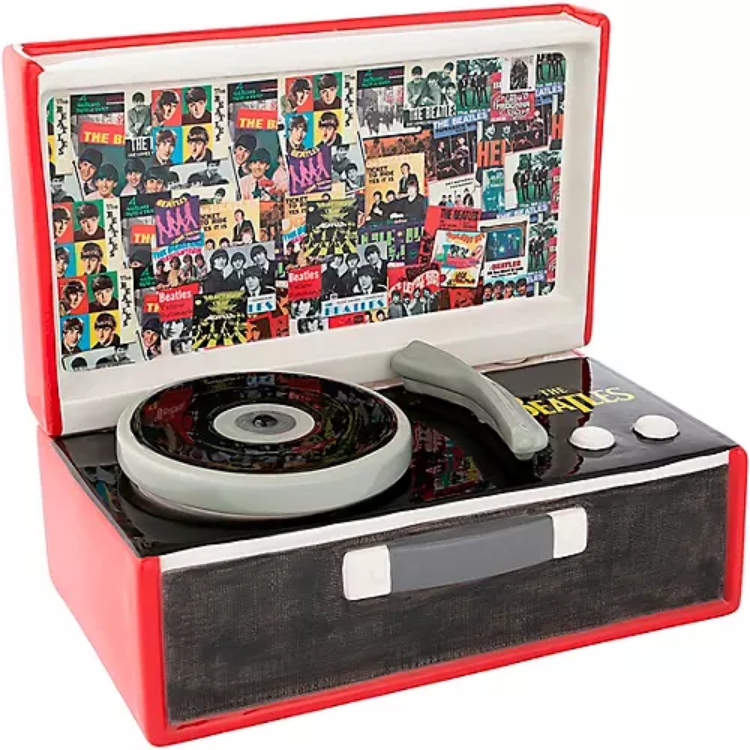- Register
- Log in to Tune-In
- Wishlist (0)
-
Shopping cart
(0)
You have no items in your shopping cart.
Beatles News

It's been 50 years since the first issue of Rolling Stone was published in California. The legendary magazine captured the spirit of the time with its unique brand of music journalism, says founding editor Michael Lydon.
When the first issue of Rolling Stone hit the news stands on November 9, 1967 — complete with a photograph of John Lennon on its front cover — nobody could've known that it would still be going strong five decades later.
"Rolling Stone found this audience instantly," remembers the publication's founding managing editor, Michael Lydon. "Immediately we were getting calls. Eric Clapton called up, the Warner Brothers from LA called up."
Source: Deutsche Welle (www.dw.com)
details
Ringo Starr calls from his hotel room amid the neon bling and bustle of Las Vegas, a Liverpudlian accent still peppering that unmistakable voice. Fresh off of rehearsal, the spry and ageless 77-year-old rocker readies for something he doesn’t have to do: tour.
“Every time I put a band together and we talk to the press, they say, ‘You want to tour? You’re still playing?’” Starr said. “And I say, ‘Yep, because that’s what I do. I’m not an electrician.’”
He’s a drummer, arguably the most significant on the planet. Thanks to his Beatles tenure and solo career, the Rock Hall of Famer continues causing countless others to pick up sticks eons after the British Invasion.
“Ringo is the archetype of a great pop-rock drummer,” said Atlanta musician and producer Robert Schneider of psychedelic rockers the Apples in Stereo. “To me, he represents drumming perfection: heavy, groovy and solid, yet a little wild and not overly technical.”
Source: Jon Waterhouse

Something in the way he grooves...
The best advice George Harrison gave his son was "Keep your head down. There's enough trouble that will find you without having to go looking for it," the 39-year-old multi-instrumentalist and film composer says in a phone interview. Dhani Harrison has inherited his dad's predilection for operating quietly and deflecting attention—as much as a musician in earth's most popular rock band could do so.
Notably, Harrison the younger is not trying to follow in the footsteps of his world-famous father. That would be a fool's errand, as Julian Lennon could tell you. Instead, Harrison is forging a distinctly 21st-century path toward a rewarding middle ground between electronic music and rock.
Source: Dave Segal
details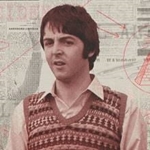
The bigger the name, the weirder the theory.
Paul McCartney became a household name when he rose to prominence as part of the Beatles in the 1960s, and his star power has held steady ever since the band broke up in 1970. But some conspiracy theorists believe that the Paul we know and love today is not Paul at all, but "Faul," or a faux Paul McCartney.
According to a longstanding theory, the real Paul McCartney isn't the septuagenarian still tearing up stages – he actually died in the early hours of November 9th, 1966, after his car skidded off an icy road and crashed into a pole.
Conspiracy theorists claim that John Lennon, George Harrison and Ringo Starr worried about how his death might impact the Beatles' huge commercial success, so they covered up his death by replacing him with a lookalike named Billy Shears, who looked, acted and even sounded the part.
Extreme theorists have pointed to discrepancies in older photos of Paul and more recent photos, claiming that details like chin shape or the placement of his ears are dead giveaways. "Faul's" head size and shape are also supposedly different from McCartney's. Some theorists even go as far as to say Shears was an orphan who had once won details
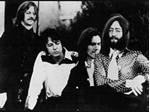
Like many of the White Album’s tracks, “Sexy Sadie” dates from the Beatles time in India studying under the Maharishi Mahesh Yogi. During this period, rumors began circulating that the Maharishi had been seducing female devotees (according to Paul McCartney, Alex Mardas — better known as “Magic Alex” — informed the group of the gossip). Disenchanted, the Beatles decided to leave, with John Lennon feeling the most betrayed.
As he told Rolling Stone in 1971, “So, we went to see Maharishi, the whole gang of us, the next day, charged down to his hut, his bungalow – his very rich-looking bungalow in the mountains – and as usual, when the dirty work came, I was the spokesman – whenever the dirty work came, I actually had to be leader … and I said ‘We’re leaving.’ ‘Why?’ he asked, and all that shit and I said, ‘Well, if you’re so cosmic, you’ll know why.’”
Source: Kit O'Toole
details
Yoko Ono considers herself part of the "young generation".
The 84-year-old artist - who is the widow of Beatles legend John Lennon - is excited about the future because she thinks people are very wise.
She said: "It excites me that the young generation is very wise. And I include myself in that."
Yoko is an avid user of social media because she finds it an effective and efficient way to communicate to many people at once.
She said: "[Twitter] communicates so quickly to so many.
"When you read 'Grapefruit' there are instructions for pieces where you can see I envisioned a life like that already."
However, she admitted she isn't thinking about audiences when working on her art.
Source: By Celebretainment
details
On October 28, 1961, a young 18-year-old entered NEMS, the largest record store in Liverpool, England and asked the manager if they had ‘My Bonnie’ by Tony Sheridan & The Beatles in stock.
Without realising it, this young man — Raymond Jones — had just changed the life of the manager and owner, Brian Epstein. Incidentally, Raymond Jones became bass guitarist with The Dakotas, Billy J. Kramer’s backing group and another of Epstein’s stable.
Earlier in 1961 Tony Sheridan was featuring in The Top Ten Club in Hamburg, Germany, when he was approached by Bert Kaempfert, a German arranger, composer and orchestra leader, who had written ‘Strangers In The Night’ for Frank Sinatra. Kaempfert offered Sheridan a recording contract with Polydor, where he was a record producer.
The Beatles were selected to be his backing group, but Kaempfert wasn’t very impressed with the group, although he liked an instrumental they played ‘Cry For A Shadow’.
Source: Benjamin Hill
details
In an exclusive conversation, the music legend speaks about his passions and how everyone can make a difference.
Paul McCartney’s campaign for people to reduce their meat consumption is a deeply personal one.
McCartney, a global icon and former Beatle who is often known more for his music than his activism, is a vegetarian himself and discussed his personal choices and passions in an interview with Susan Goldberg, editor-in-chief of National Geographic magazine.
“I support a lot of causes, but this particular one is personal for me because it is how I live,” said McCartney. “Through this campaign, I can say to people, ‘Just try it’ and show that it can actually be quite fun when you look at what you do, what you eat, how you live and think, ‘is this what I'm gonna do for the rest of my life or would it be interesting to try making a change?’”
Source: news.nationalgeographic.com
details
As Catalan President Carles Puigdemont spoke at a press conference in Brussels, details emerged of a Madrid document that partly blames the current crisis in Spain on a number of well known people from around the world. The Spanish government specifically named WikiLeaks founder Julian Assange and artist Yoko Ono as encouraging the Catalan independence referendum.
Brussels press conference
At the press conference, Puigdemont made it clear he was not in Brussels to claim asylum:
He also said he accepted the snap election for Catalonia, imposed by Spanish Prime Minister Mariano Rajoy, on 21 December.
He added that he and his colleagues would return to Catalonia once it is guaranteed they could act “with freedom and without threats”.
Source: Tom Coburg
details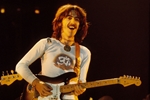
Although most of us might instantly jump to The Beatles when someone says George Harrison, in actual fact Harrison’s career took a leap almost as impressive in the 1990s.
After the release of his hit single I’ve Got My Mind Set On You in 1987, Harrison skyrocketed as a less than likely pop sensation of the time. He then jumped on the road for an unexpected tour alongside Eric Clapton across Japan in 1991.
Source: hhhappy.com
details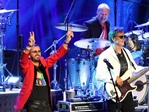
Fans are flocking to the Abraham Chavez Theater to see Ringo Starr and His All-Star Band.
A former member of The Beatles, Ringo is known for providing lead vocals in hits like "Yellow Submarine" and "Little Help From My Friends".
He last performed in El Paso in 2003. George Reynoso, owner of All That Music & Video, says none of the other band members have ever performed in El Paso.
"It's huge, especially if you're into The Beatles and Beatles music," Reynoso said.
Reynoso describes The Beatles as legendary. He says Ringo wasn't taken very seriously, after joining the band in 1962, replacing Pete Best.
"But in time as The Beatles gained credibility so did Ringo as the world's most very very highly respected musician drummer," Reynoso said.
Ringo performed in Las Vegas Sunday night. He's expected to sing his classics, along with songs from his solo records in El Paso Monday.
The show starts at 8 p.m. Doors open at 7 p.m.
Officials at the theater say they're expecting the show to be a sell-out.
details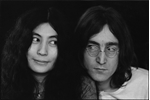
John Lennon’s Holiday Card to Yoko Ono’s Ex
During the holiday season of 1968, Yoko Ono’s second husband, Anthony Cox, received a card from Ono, then still his wife, and her boyfriend, John Lennon. In it, Lennon and Ono informed Cox that Ono had taken most of her things from her shared home with Cox—in other words, she was officially moving on with Lennon, whom she met in 1966. This card, not exactly full of holiday mirth, can now belong to a lucky Beatles fan for $15,000 via momentsintime.com.
Though that seems like a steep price for a Christmas card, the note does contain a bonus message for Cox, from Lennon. In a separate note written on Apple Records letterhead, Lennon asked Cox if he could send two of Ono’s short films and master tapes from a recent performance with jazz musician Ornette Coleman. “Also, we want to get on with producing Ornette-Yoko record under Apple before Easter. That will be very good,” he wrote.
Source: Hilary Weaver
details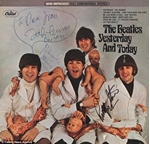
The rare pre-production Yesterday and Today album featured the butcher cover
Controversially, it showed Fab Four draped in meat and decapitated baby dolls
John Lennon's personal copy was salvaged by a fan who has put it up for auction
It will go under the hammer on November 11 in Dallas, TX, with a $200k estimate.
John Lennon's personal copy of a Beatles album with hand-drawn sketches dubbed the world's rarest album is set to fetch more than $200,000 as it goes up for auction.
The rare pre-production Yesterday and Today album with the infamous butcher cover will go up for auction on November 11 in Dallas, Texas.
It was John Lennon's personal copy and sports one of his illustrations on the back of a man with his shovel and a dog in front of a setting sun.
The Yesterday and Today prototype was pulled two days after its release because of the controversial cover artwork and all were destroyed apart from a few - including this one owned by Lennon himself - before a tamer version was hurriedly re-released.
Source: Gareth Davies For Mailonline

A set of unseen images of John Lennon, which were in a "junk drawer" for over 30 years because they were thought to have no value, have been unveiled.
The 26 negatives, dating from 1970, were brought to a valuation day at Liverpool's The Beatles Story museum.
Their owner said his late father may have come by them while studying art in the 1970s.
The "intimate portraits" were "a rare find" and could be worth £10,000, auctioneer Darren Julien said.
He added that it was "not often when you find images of John Lennon that have never before been seen by the public".
Source: BBC
details
Paul McCartney has paid tribute to late rock and roll icon Fats Domino, describing meeting his idol and calling him a “huge influence” on The Beatles.
Domino passed away on Tuesday (October 24) at the age of 89. He died of natural causes.
McCartney has now posted a tribute to his official website, calling Domino a “great rock ’n’ roll pianist and singer” and describing him as “truly magnificent”.
“We were excited to meet Fats once in his home town of New Orleans,” McCartney wrote. “He was wearing a huge star spangled diamond encrusted watch which was our first encounter with bling!”
Source: nme
details
